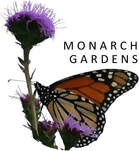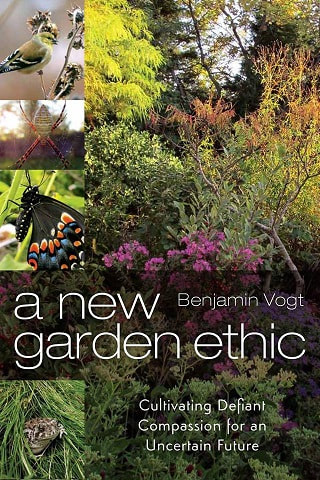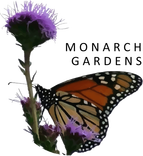There's a vein that runs through native plant detractors that is very disturbing to me, one which I don't condone on any level or think has any validity -- it's just frightening, in fact. Some clutch on to it for comfort and trot it out when the discussion devolves into emotion only. I'm talking about calling native plant proponents racist. The assumption equates plants with people, the culture of plants and ecosystems with the culture of people (white, western most likely), which is a way to practice dominion over nature.
Let's get one thing straight -- when a native plant advocate is labeled as racist it's a defense of privilege. We've assumed a hierarchy of species on this planet, constantly defending it with art, industry, & commerce. When our compassion for other species matches or supersedes compassion for humans, that's not racism -- that's liberation.
Native plants are social justice for all species. There is nothing racist about fostering equality for other species; however, human supremacists would lead you to believe there is. Those with privilege are threatened by decolonizing traditional horticulture, a horticulture which is grounded on new plant introductions, whether discoveries from around the world or new selections and crosses. Privilege is placing a plant in an ecoregion it did not evolve in, with fauna it did not evolve with, primarily because a human wants it there.
I think what's at stake is this idea that using only or primarily native plants in gardens is constrictive and speciesist, namely speciesist against human freedom / domination / privilege / supremacy. And then somehow the conversation devolves into an accusation of racism or purity along the lines of Nazi Germany. That's ridiculous hyperbole and an insult to those who suffered and still suffer under totalitarianism -- human and other. (For more on debunking the Nazi connection to native plant proponents, see this excellent piece and especially its links.)
A new garden ethic is not about denying human rights or freedom but expanding those of the plants & animals around us who are vanishing because we have been racist toward them, colonizing their culture and forcing it to conform to ours or die. If this feels threatening or makes you angry so you lash out, then we've hit the nail on the head, haven't we.
Make no mistake, fighting for justice on behalf of plants, animals, and ecosystems is directly related to the fight made for women, people who aren't white, people who aren't straight, people who live in poverty, people who don't practice Christianity, etc. When we allow for the freedom of wildness in our cities, for example, we are providing social justice not only for birds and bees and butterflies and milkweed, but for those humans who have no other access to nature but who benefit through cleaner air, cleaner water, and increased mental health.
In the end, we all agree on one primary point -- biodiversity is threatened at a level never before witnessed by humans because we are the cause. As we move forward to mitigate mass extinction / mass genocide, it's important we remember that native plants aren't divisive among the silent majority -- 99% of the tallgrass is gone, but the wildlife that uses it are still among us hoping for a revolution of compassion and an end to human supremacy.
--------------
And here are some thoughts on language -- how we use it to go down two different roads in garden thinking:
1) Knowing the names of fauna means we have to consider their rights more thoughtfully in garden design
Here's a new theory based on a growing sample size: when we learn the names of fauna in our gardens -- spider, beetle, bee, and wasp -- we learn their life cycles and what they need to thrive. But this will then also mean our gardens (how plants are arranged) and plants (origin and ecosystem services) will often need to change, which is a direct challenge to human privilege. This is why some garden designers get worked up or outright defensive when asked to i.d. a species because, in part, the garden design process has been complicated by considering other species alongside our own. While naming is considered a classic act of ownership in environmental philosophy, in this case naming may be a gateway to equality.
2) It matters how we discuss gardens because our words reflect, inform, and develop our values.
If, for example, we discuss gardens using primarily words like "texture," "form," and "color" we aren't necessarily valuing nature or wild interactions within it like we may assume we are. When we idealize plants as objects, putting them on a pedestal of visual gratification for us, we are practicing not only privilege but supremacy (the same idea goes for calling plants and gardens "magical"). This practice gives us tacit permission to see other species and the garden in a way that primarily if not totally benefits us alone; instead of gardening as part of a web, we garden as the top of hierarchy.
There is no reason a garden can not be beautiful to both humans and countless other species, but if the texture, form, and color are not appealing to specific species of fauna then the garden is not performing its primary role. Unfortunately, knowing what species of fauna are using the garden, and how they are using it, requires a more intense, complicated, and research-based step that prevents the garden from being an easily digestible painting we walk by and admire for a moment.
In a time of mass extinction it is not enough to discuss or design gardens purely for aesthetic value; doing so is an archaic and destructive way that continues a colonialist mindset over place and cultures for the benefit of a powerful minority. If we can't evolve our words, how can we evolve our knowledge and compassion for nature in meaningful ways that cultivate a deeper beauty beyond flower color and leaf form?


 RSS Feed
RSS Feed

